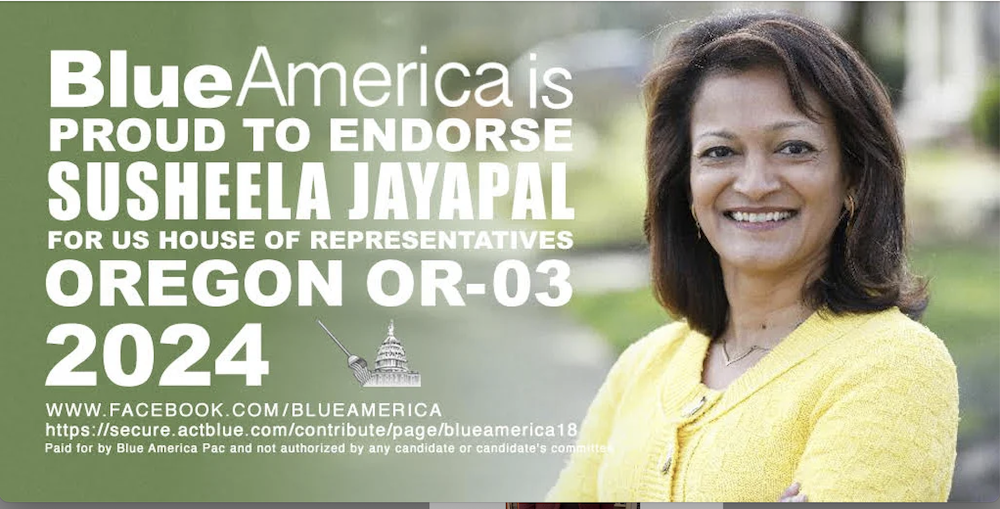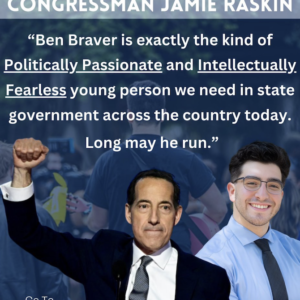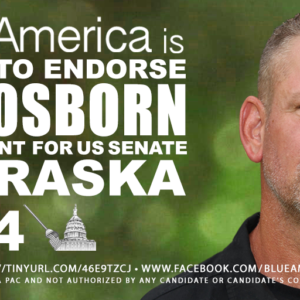Blue America has endorsed dozens of candidates since we started in 2006. Some— like Elizabeth Warren, AOC, Bernie, Ted Lieu, Jamie Raskin, Jeff Merkley— have turned out spectacularly while others, like Jared Golden, stand as an important reminder of our own fallibility. But no endorsement has “paid off” as handsomely as the one we made in 2016 for Pramila Jayapal, then a state senator from Seattle, now the chair of the Progressive Congressional Caucus. Last year, Pramila introduced us to her sister, Multnomah County commissioner Susheela Jayapal. Susheela was contemplating a run for the seat Earl Blumenauer would be leaving open upon his retirement.
She has since declared her candidacy and Blue America endorsed her, enthusiastically.
OR-03, basically Portland and some of its suburbs, is very Democratic and very progressive. In 2020, Trump barely managed to take a quarter of the vote. The partisan lean is D+43. I feel safe to say that whomever wins the Democratic primary will be going to Congress— and not all the half dozen or so Democrats in the race are any good and only one stands out on a level of progressiveness worth getting excited about: Susheela.
She came to the U.S. to study, where she earned a degree in economics from Swarthmore and then a law degree from the University of Chicago. She has lived in Portland for nearly 3 decades, raising two children, an outspoken champion for reproductive rights, education and economic justice, including comprehensive solutions to homelessness. In the hope that you will get to know her well enough to contribute to her campaign, we’ve asked her to share her ideas on where we need to head to fix the post-Obamacare healthcare system.
ObamaCare Was A Step, Not A Destination
By Susheela Jayapal
The events of the past few years have made it clear— a radical reinvention of our healthcare system is the only way forward… but the solution isn’t actually that radical at all.
A global pandemic revealed how fractured, expensive, and broken our health system is, and just how at risk the un- or under-insured are. As a county commissioner, I saw the huge gaps in access to care up close, and spent most of my first term fighting to make sure that folks got access to the the testing, vaccines, and wrap-around support they needed. Employer-based insurance is untenable, and only compounds hardship from job loss (if you are lucky enough to have employer-based coverage at all in this increasingly gig-reliant economy— but that’s a topic for a later post).
The relentless attack on reproductive health care has seen a radical Supreme Court overturn Roe v. Wade. Republicans continue to work state by state and nationally to ban ALL abortion, without exceptions for children or victims of rape and incest. Medication abortion is currently under review by courts, further affecting patients who seek help across state lines. (As a former Planned Parenthood board member and someone who has sought her own abortion, our regression on abortion is particularly painful to see)
Less affluent and communities of color— and in particular Black women— continue to suffer unequal, inequitable access and worse outcomes than those from affluent and white communities.
Red states still stubbornly refuse to expand Medicaid and take advantage of federal benefits that would expand coverage, lower costs, and ensure more affordable coverage for millions more people.
Lifesaving medical care for trans children and adults is under attack in states across the country.
Private health insurance and the crushing cost of healthcare and prescription drugs is an enormous regressive tax on working Americans. An estimated 100 million Americans have amassed nearly $200 billion in collective medical debt according to the Kaiser Family Foundation, and medical debt is the leading cause of personal bankruptcy. And insurance costs are crushing small businesses.
I don’t disregard the progress that Obamacare has made in lowering many costs, protecting coverage for those with pre-existing conditions, beginning the efforts for mental health parity, and other gains— but it hasn’t done nearly enough and we must go further.
Health care is a human right and everyone deserves access to quality, affordable— and equitable— health care. We need radical change, but getting there isn’t as radical or complicated as some politicians want us to believe… in fact, we have had the blueprint in place, since it was passed by a bipartisan Congress and enacted in 1965.
Medicare currently serves nearly 20 percent of the population already, or 65 million people— seniors and those with long-term disabilities. As former Centers for Medicare & Medicaid Services administrator Nancy-Ann Min DeParle wrote, “few programs in the history of the United States have brought as much benefit to society as Medicare,” and it has significantly reduced poverty. Medicare is “very important” to nearly 80 percent of Americans, who also say its programs are working well. You won’t find many things that 80 percent of Americans can agree upon these days.
In Congress, I’m going to fight to expand Medicare for everyone. Medicare for All will both save lives and result in billions of dollars of savings on health care spending— and a majority of the American public support it.
Guaranteed, free access to coverage and care for everyone— including benefits for immigrants, equitable gender and LGBTQ+ inclusive coverage, lower cost premiums and prescription drugs, and abortion and reproductive health coverage— is possible and we know how to do it. What’s so radical about that?










Comments